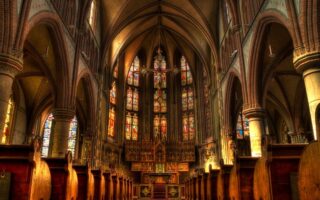If you are contemplating whether or not to become an Orthodox monk, there are several factors to consider. This decision involves a deep commitment to a life of spiritual devotion, asceticism, and service to the Orthodox Church. It is important to carefully reflect on your personal motivations, spiritual calling, and readiness for a life of solitude and self-denial. Additionally, seeking guidance from spiritual mentors and engaging in discernment processes within the Orthodox community can provide valuable insights. Ultimately, the decision to become an Orthodox monk is a deeply personal one that requires careful consideration and a genuine desire to dedicate one’s life to God and the Church.
Table of Contents
The Spiritual Journey of Becoming an Orthodox Monk
Have you ever found yourself questioning the purpose of life? Wondering if there is more to existence than the daily grind? If so, you’re not alone. Many people experience a deep longing for something greater, a spiritual connection that transcends the material world. For some, this longing leads them on a journey of self-discovery and exploration, ultimately leading them to consider becoming an Orthodox monk.
Becoming an Orthodox monk is not a decision to be taken lightly. It is a commitment to a life of prayer, asceticism, and service to God and others. The path to becoming a monk is a spiritual journey that requires dedication, discipline, and a deep desire to seek God.
One of the first steps on this journey is discernment. Discernment is the process of seeking God’s will for your life and determining if the monastic life is the path He is calling you to. This process involves prayer, reflection, and seeking guidance from a spiritual father or mentor. It is important to take the time to listen to your heart and discern if the monastic life aligns with your deepest desires and values.
If you feel a strong calling to the monastic life, the next step is to immerse yourself in the Orthodox faith. This involves attending services regularly, participating in the sacraments, and deepening your understanding of the teachings and traditions of the Church. It is through this immersion that you will begin to develop a deeper relationship with God and a clearer understanding of the monastic life.
As you continue on your spiritual journey, you may find it helpful to visit monasteries and spend time with monks. This will give you a firsthand experience of the monastic life and allow you to see if it resonates with your soul. Spending time in a monastery will also provide an opportunity to learn from experienced monks and gain insight into the challenges and rewards of the monastic life.
During this time of exploration, it is important to cultivate a life of prayer and spiritual discipline. This will help you develop the habits and mindset necessary for the monastic life. Regular prayer, fasting, and reading of spiritual texts will deepen your relationship with God and prepare you for the challenges that lie ahead.
As you progress on your spiritual journey, you may feel a growing sense of peace and fulfillment. This is a sign that you are on the right path. However, it is important to remember that the monastic life is not an escape from the world, but rather a way to fully engage with it. Monks are called to serve others and be a light in the world, even as they withdraw from its distractions.
Ultimately, the decision to become an Orthodox monk is a deeply personal one. It requires a willingness to let go of worldly attachments and embrace a life of simplicity, humility, and obedience. It is a commitment to seek God above all else and to live in communion with Him and His Church.
If you are considering becoming an Orthodox monk, take the time to discern, immerse yourself in the faith, and seek guidance from experienced monks. Remember that the monastic life is a journey, and it is important to be patient and open to God’s will. May your spiritual journey be filled with peace, joy, and a deepening love for God and His people.
The Role and Responsibilities of an Orthodox Monk

Have you ever wondered what it would be like to become an Orthodox monk? The life of an Orthodox monk is one of dedication, discipline, and devotion. In this article, we will explore the role and responsibilities of an Orthodox monk, helping you decide if this path is right for you.
First and foremost, it is important to understand that becoming an Orthodox monk is a lifelong commitment. It is not a decision to be taken lightly. The role of an Orthodox monk is to dedicate their life to God and to live in accordance with the teachings of the Orthodox Church. This means that they must be willing to give up worldly possessions and live a life of simplicity and humility.
One of the primary responsibilities of an Orthodox monk is prayer. Monks spend a significant amount of their day in prayer, both individually and as a community. They follow a strict schedule of prayer, which includes morning and evening services, as well as various other times throughout the day. Prayer is seen as a way to connect with God and to seek His guidance and blessings.
In addition to prayer, Orthodox monks also engage in manual labor. This can include tasks such as gardening, cooking, cleaning, and maintaining the monastery. The purpose of manual labor is not only to contribute to the upkeep of the monastery but also to cultivate a spirit of humility and selflessness. By engaging in physical work, monks learn to detach themselves from worldly desires and focus on serving others.
Another important responsibility of an Orthodox monk is obedience. Monks are expected to submit themselves to the authority of their spiritual father, who is usually the abbot of the monastery. This obedience is seen as a way to cultivate humility and to learn to trust in the wisdom and guidance of others. It is through obedience that monks learn to let go of their own will and desires and to surrender themselves completely to God.
Hospitality is also a key aspect of the monastic life. Monks are expected to welcome guests and visitors to the monastery with open arms. This includes providing them with food, shelter, and spiritual guidance. The act of hospitality is seen as a way to practice love and compassion towards others, as well as an opportunity to share the teachings of the Orthodox Church.
Lastly, an Orthodox monk is called to be a spiritual guide and mentor to others. They are often sought out for their wisdom and guidance, and they offer spiritual counsel to those who seek it. This role requires a deep understanding of the Orthodox faith and a commitment to helping others on their spiritual journey.
In conclusion, the role and responsibilities of an Orthodox monk are multifaceted and require a deep commitment to God and the Orthodox Church. It is a life of prayer, manual labor, obedience, hospitality, and spiritual guidance. If you are considering becoming an Orthodox monk, it is important to carefully consider these responsibilities and to seek guidance from a spiritual advisor. Only then can you make an informed decision about whether this path is right for you.
Challenges and Sacrifices of Choosing the Orthodox Monastic Life
Choosing to become an Orthodox monk is a decision that comes with its fair share of challenges and sacrifices. It is not a path for the faint of heart, but for those who are truly dedicated to a life of spiritual devotion and selflessness. In this article, we will explore some of the challenges and sacrifices that one may encounter on this journey.
One of the first challenges that aspiring monks may face is the renunciation of worldly possessions. In the monastic life, material possessions are seen as distractions from the pursuit of spiritual growth. This means giving up personal belongings, wealth, and even relationships. It can be a difficult adjustment, as we are often attached to our possessions and the people in our lives. However, by letting go of these attachments, monks are able to focus solely on their spiritual journey.
Another challenge that monks face is the rigorous daily routine. Monastic life is highly structured, with a strict schedule of prayer, work, and study. This disciplined lifestyle requires a great deal of self-discipline and commitment. Waking up early in the morning for prayer, engaging in physical labor, and dedicating hours to studying religious texts can be physically and mentally demanding. However, it is through this routine that monks find a sense of purpose and fulfillment.
Isolation is yet another sacrifice that monks must make. Living in a monastery often means being separated from the outside world and the comforts of modern society. Monks may live in remote locations, far away from family and friends. This solitude can be challenging, as humans are social beings who crave connection and companionship. However, it is in this isolation that monks find the space and silence necessary for deep contemplation and communion with God.
Financial stability is also a sacrifice that comes with the monastic life. Monks rely on the support of their community and the generosity of others for their basic needs. They do not earn a salary or accumulate wealth. This lack of financial security can be daunting, especially in a world that places great importance on material wealth. However, monks believe that by relying on the providence of God and the support of their community, they are able to live a life of simplicity and detachment from worldly concerns.
Lastly, the vow of obedience is a significant challenge for those considering the monastic life. Monks must submit themselves to the authority of their superiors and follow the rules and regulations of their monastery. This means surrendering personal desires and preferences in favor of the greater good of the community. It requires humility and a willingness to let go of one’s own will. However, through obedience, monks learn to trust in the wisdom and guidance of their spiritual leaders, and ultimately, in the will of God.
In conclusion, choosing to become an Orthodox monk is a path that is filled with challenges and sacrifices. It requires renouncing worldly possessions, embracing a disciplined routine, living in isolation, relying on the support of others, and surrendering personal desires through obedience. However, for those who are truly called to this way of life, the rewards are immeasurable. The monastic life offers a deep sense of purpose, spiritual growth, and a profound connection with God. It is a journey that requires great courage and dedication, but for those who are willing to make the sacrifices, it can be a path of profound transformation and fulfillment.
Benefits and Rewards of Embracing the Orthodox Monastic Path
Are you considering a life of devotion and spiritual contemplation? Have you ever wondered what it would be like to become an Orthodox monk? If so, you may be interested in exploring the benefits and rewards that come with embracing the Orthodox monastic path. While this lifestyle may not be for everyone, it offers a unique opportunity for personal growth, deepening of faith, and a sense of purpose.
One of the most significant benefits of becoming an Orthodox monk is the opportunity for spiritual growth. Monastic life provides a structured environment that encourages individuals to focus on their relationship with God and their own spiritual development. Through daily prayer, meditation, and contemplation, monks are able to cultivate a deep sense of inner peace and connection with the divine. This dedicated time for spiritual practice allows for a profound transformation of the soul and a deepening of one’s faith.
In addition to spiritual growth, embracing the monastic path also offers a sense of community and belonging. Monasteries are often close-knit communities where individuals live and work together in pursuit of a common goal – to serve God and others. This sense of belonging can be incredibly fulfilling and provide a support system that is difficult to find in the outside world. The bonds formed within a monastic community can be lifelong and provide a sense of camaraderie and shared purpose.
Furthermore, becoming an Orthodox monk allows for a simplified and minimalist lifestyle. Monastic life often involves a detachment from material possessions and a focus on living a simple and humble existence. This simplicity can be liberating, as it frees individuals from the distractions and pressures of the modern world. By embracing a minimalist lifestyle, monks are able to prioritize their spiritual journey and focus on what truly matters – their relationship with God and their own personal growth.
Another reward of the monastic path is the opportunity to serve others. Monks are often involved in various forms of service, such as offering spiritual guidance, providing hospitality to visitors, and engaging in acts of charity. This service-oriented mindset allows monks to make a positive impact on the lives of others and contribute to the well-being of their community. By dedicating their lives to serving God and others, monks find a deep sense of fulfillment and purpose.
Lastly, becoming an Orthodox monk offers the chance to live a life of peace and solitude. Monastic life provides a retreat from the noise and busyness of the world, allowing individuals to find solace in silence and solitude. This solitude provides an opportunity for introspection, self-reflection, and a deepening of one’s relationship with God. It is in this quiet and peaceful environment that monks can truly listen to the voice of God and find clarity and direction in their lives.
In conclusion, embracing the Orthodox monastic path offers numerous benefits and rewards. From spiritual growth and a sense of community to a simplified lifestyle and the opportunity to serve others, becoming an Orthodox monk can be a deeply fulfilling and purposeful choice. However, it is important to carefully consider whether this path aligns with your own values, beliefs, and aspirations. If you feel drawn to a life of devotion and contemplation, exploring the monastic path may be a transformative and enriching experience.
Conclusion
In conclusion, the decision to become an Orthodox monk is a deeply personal and spiritual one. It requires a strong commitment to a life of prayer, asceticism, and service to God and others. It is important to carefully consider the demands and challenges that come with this vocation, as well as seek guidance from spiritual mentors and leaders within the Orthodox Church. Ultimately, only you can determine if becoming an Orthodox monk is the right path for you.
For licensing reasons, we must provide the following notice: This content was created in part with the help of an AI.


